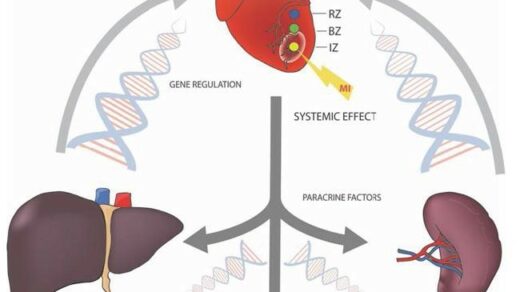Read short summaries of the latest research published by Oncotarget.

Oncotarget’s Volume 12, Issue #8
New Publications
Cover (Research Paper): Prognostic and therapeutic value of the Hippo pathway, RABL6A, and p53-MDM2 axes in sarcomas
Origin: Iowa, Alabama, Minnesota, United States
Institutions: University of Iowa, University of Alabama at Birmingham, Mayo Clinic
Quote: “Additional prognostic and therapeutic biomarkers effective across different histological types of sarcoma are needed. Herein we evaluate expression of TAZ and YAP, the p53-MDM2 axis, and RABL6A, a novel oncoprotein with potential ties to both pathways, in sarcomas of different histological types.”
News (PDF download): Immunotherapy and fatigue: what we know and what we don’t know
Origin: Utah, United States
Institution: University of Utah
Quote: “News on: Testosterone deficiency in men receiving immunotherapy for malignant melanoma by Peters et al.”
Editorial Paper (PDF download): Drug exposure: still relevant after all these years
Origin: Texas, United States
Institution: Texas Tech University Health Sciences Center
Quote: “With the advent of immune checkpoint inhibitors, exploratory biomarkers now reflect patient as well as tumor biology, such as gut microbiome or HLA type [14, 15]. Amid these promising and complex developments, let us not forget basic and essential questions such as drug dosing and exposure.”
Editorial Paper (PDF download): Up to your NEK2 in CIN
Origin: Ohio, United States
Institution: Case Western Reserve University School of Medicine
Quote: “While low/moderate level CIN promotes cancer cell fitness, allowing cells to adapt and survive chromosomal insults and environmental stress, the excessive rates of CIN induced by taxanes causes excessive, unrecoverable damage [12].”
Research Paper: Analytic validation and clinical utilization of the comprehensive genomic profiling test, GEM ExTra®
Origin: Arizona, United States
Institution: Ashion Analytics, LLC
Quote: “We developed and analytically validated a comprehensive genomic profiling (CGP) assay, GEM ExTra, for patients with advanced solid tumors that uses Next Generation Sequencing (NGS) to characterize whole exomes employing a paired tumor-normal subtraction methodology.”
Research Paper: Insulin-like growth factor 1/Child-Turcotte-Pugh composite score as a predictor of treatment outcomes in patients with advanced hepatocellular carcinoma treated with sorafenib
Origin: Texas, Massachusetts, United States; Cairo, Egypt
Institutions: The University of Texas MD Anderson Cancer Center, Massachusetts General Hospital, Harvard Medical School, Ain Shams University
Quote: “In this prospective study, patients with HCC were treated with sorafenib and followed up until progression/death. We calculated the IGF/CTP score and used the Kaplan-Meier method and log-rank test to estimate and compare the time-to-event outcomes between patient subgroups.”
Research Paper: Controlling for cellular heterogeneity using single-cell deconvolution of gene expression reveals novel markers of colorectal tumors exhibiting microsatellite instability
Origin: Virginia, United States
Institution: University of Virginia
Quote: “We performed single-cell deconvolution of bulk RNA-sequencing on The Cancer Genome Atlas colon adenocarcinoma (TCGA-COAD) dataset. […] By incorporating cell composition into our regression model, we identified 3,193 differentially expressed genes (q = 0.05), of which 556 were deemed novel.”
Research Paper: Urine protein biomarkers of bladder cancer arising from 16-plex antibody-based screens
Origin: Texas, United States
Institution: University of Houston, UT Southwestern Medical Center
Quote: “The purpose of this study is to identify novel urine protein biomarkers of bladder cancer using a Luminex based screening platform.”
Research Paper: The acylfulvene alkylating agent, LP-184, retains nanomolar potency in non-small cell lung cancer carrying otherwise therapy-refractory mutations
Origin: Texas, Maryland, United States
Institutions: Lantern Pharma, Inc., REPROCELL USA Inc.
Quote: “We sought to assess LP-184 activity in a panel of selected NSCLC adenocarcinoma cell lines, determine associations between genomic and transcriptomic profiles and responses of cell lines tested, and compare in vitro potency of LP-184 with that of approved chemotherapy agents.”
Research Paper: Loss of CPAP causes sustained EGFR signaling and epithelial-mesenchymal transition in oral cancer
Origin: South Carolina, United States
Institution: Medical University of South Carolina
Quote: “In this manuscript, we show that CPAP depletion leads to elevated cellular levels of, and signaling by, EGFR in them. CPAP-loss alone is sufficient to cause spontaneous EMT-like features in OSCC cells and increase their invasiveness and tumorigenicity.”
Research Paper: Carcinoma cells that have undergone an epithelial-mesenchymal transition differentiate into endothelial cells and contribute to tumor growth
Origin: Texas, United States; Hamamatsu, Japan; Glasgow, United Kingdom
Institutions: The University of Texas MD Anderson Cancer Center, Texas A&M University, Hamamatsu University School of Medicine, Cancer Research UK Beatson Institute
Quote: “Given the inherent plasticity of cells that have undergone EMT and the involvement of hypoxia in EMT and angiogenesis, we sought to ascertain whether cells, undergoing EMT in the hypoxic milieu, can acquire endothelial cell attributes and augment tumor growth by directly contributing to the tumor vasculature.”
Research Paper: Predicting clinical outcomes using cancer progression associated signatures
Origin: Victoria, Australia
Institutions: Monash University, University of Melbourne
Quote: “Somatic mutation signatures are an informative facet of cancer aetiology, however they are rarely useful for predicting patient outcome. The aim of this study is to evaluate the utility of a panel of 142 mutation-signature–associated metrics (P142) for predicting cancer progression in patients from a ‘TCGA PanCancer Atlas’ cohort.”
Research Paper: High in vitro and in vivo synergistic activity between mTORC1 and PLK1 inhibition in adenocarcinoma NSCLC
Origin: Paris, Maisons Alfort, Suresnes, Lyon, France
Institutions: PSL University, Institut Curie, Xentech, National Veterinary School of Alfort, Hôpital Foch, Centre Léon Bérard
Quote: “Significant rational is available for specific targeting of PI3K/AKT/mTOR pathway in the treatment of non-small cell lung cancer (NSCLC). However, almost all clinical trials that have evaluated Pi3K pathway-based monotherapies/combinations did not observe an improvement of patient’s outcome. The aim of our study was therefore to define combination of treatment based on the determination of predictive markers of resistance to the mTORC1 inhibitor RAD001/Everolimus.”
Click here to read Oncotarget’s Volume 12, Issue #8.
—
Oncotarget is a unique platform designed to house scientific studies in a journal format that is available for anyone to read—without a paywall making access more difficult. This means information that has the potential to benefit our societies from the inside out can be shared with friends, neighbors, colleagues, and other researchers, far and wide.

For media inquiries, please contact media@impactjournals.com.



